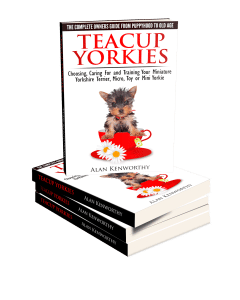Dog food can be confusing. Try to think of it in the way you would with human food: is it full of preservatives and colorings?
The teacup Yorkie needs to be fed little and often to maintain his blood sugar and well-being. I read something recently that said certain unethical breeders are advising underfeeding makes and maintains smaller dogs. This is shocking and disturbing.
A dog, particularly a puppy, should never be underfed.
When you bring a tiny Yorkie puppy home he should be fed at least six times a day. Small amounts are important to keep his blood sugar regular and healthy.
Adulthood starts at adolescence, which is ten months old, and at that point the tiny Yorkie should be fed twice or three times a day.
A good breeder will advise you on the type of food the dog eats currently, how many times a day he is being fed at the moment, and should even send you away with an amount of food to help wean your dog onto the food you would prefer to feed.
Note that while we mostly refer to Teacup Yorkies, these precious dogs are also often called small or miniature Yorkshire Terrier dogs, Toy, Micro, Mini Yorkies or Teacup Yorkshire Terriers.
While feeding and diet are obviously important you may also want to refer to our Teacup Yorkie health section as well as grooming care and bathing.
Teacup Yorkie Digestion
A dog’s digestive tract is short and simple and designed to move their natural choice of food (hide, meat and bone) quickly through their systems.
The canine digestive system is simply unable to properly break down vegetable matter, which is why whole vegetables look pretty much the same going into your dog as they do coming out the other end.
Given the choice, most dogs would never choose to eat plants and grains or vegetables and fruits over meat, however, we humans continue to feed them a kibble-based diet that contains high amounts of vegetables, fruits and grains and low amounts of meat.
Part of this is because we’ve been taught that it’s a healthy, balanced diet for humans, and therefore, we believe that it must be the same for our dogs, and part of this is because all the fillers that make up our dog’s food are less expensive and easier to process than meat.
How much healthier and long lived might our beloved teacup Yorkie be if instead of largely ignoring nature’s design for our canine companions, we chose to feed them whole, unprocessed, species-appropriate food with the main ingredient being meat? You have spent a lot of money buying a Teacup Yorkie so it would be silly to give them cheap food and suffer expensive vet bills later down the line!
Whatever you decide to feed your dog, keep in mind that just as too much wheat, other grains and other fillers in our human diet is having a detrimental effect on our health, the same can be very true for our best fur friends.
Our dogs are also suffering from many of the same life-threatening diseases that are rampant in our human society as a direct result of consuming a diet high in genetically altered, impure, processed and packaged foods.
Hypoallergenic dog food is free of fillers, additives, colorings, wheat and preservatives. It is often labeled as premium dog food in today’s market. These are high quality foods, certainly in comparison to most of the supermarket branded dog foods.
Additives can have an effect on your dog similar to E-numbers on a child. The cheaper foods can seem better value, however the higher quality food is fed in smaller quantities due to being better concentrated, and therefore the apparent saving in buying cheaper foods can deceive.
The cheaper foods tend to have larger amounts of what is known as ‘fillers’. These are ingredients with no or very little nutritional value. Of course they are very low cost and plump out the food to make it look like there is more quantity.
While it may well fill up your pet’s stomach, it won’t give him the valuable nutrition he needs for his health.
Dry food or kibble is probably the easiest to prepare, with a squirt of warm water and a tasty morsel to start off the eating process. There are many dry food types from numerous manufacturers. The important thing about food for a teacup Yorkie is that the food is specifically designed for a tiny tummy.
Tinned food is often highly processed meat that contains water, flavorings and they can be quite salty.
Dogs require a lot of tinned food due to its ratio of amount versus nutrition, and even supplemented with biscuit this can equate to expensive feeding costs.
You may try your dog on different foods before settling on one type. Be careful if changing food, though.
Weaning gradually onto a new food is important. Doing this correctly will give your dog the best chance of keeping a settled stomach during the change process. It’s a simple process where over a few days you mix the current and the future food gradually, giving the dog’s stomach a chance to adjust.
TIP: grated parmesan cheese sprinkled on a dinner will help to stop picky eaters from ignoring their food.
Because your Yorkie is so small, you may even find that homemade food works perfectly for you. There are certain nutrients that he will need to grow properly, but if you use meat and introduce a lot of leafy green vegetables, you can create a nice array of recipes to keep your pet healthy.
I wanted to write this guide dedicated to caring, looking after and training miniature Yorkshire Terriers because they are a character all of their own.
Alan Kenworthy
PS – Want to know even more – take a look at my bestselling Miniature Yorkshire Terrier book…

